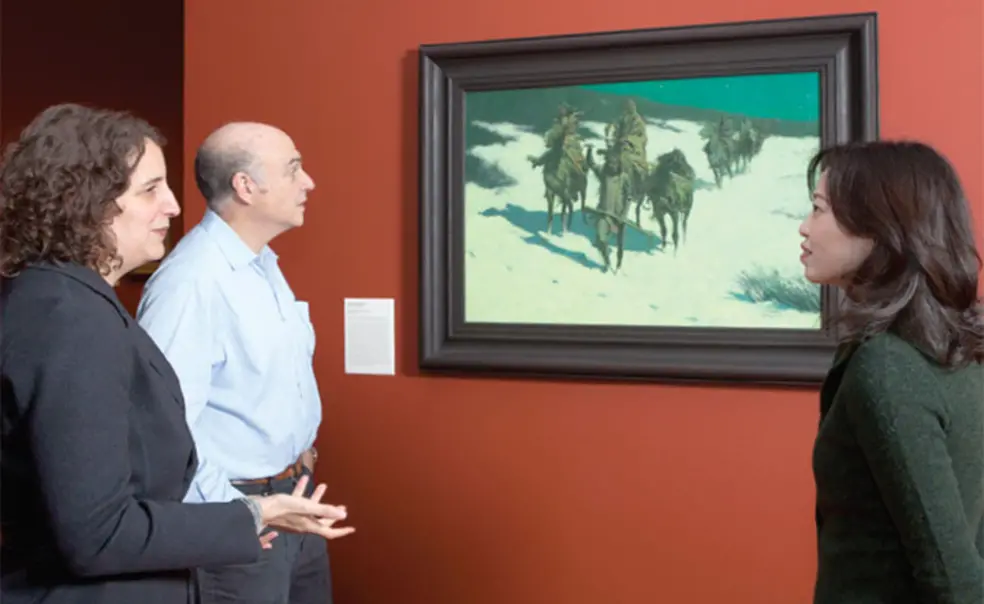American Studies at 75: Charting New Directions
Interdisciplinary scholarship and undergraduate certificate programs are now so common at Princeton that it is hard to imagine the University without them. But in 1942, the idea of a multidisciplinary program in American civilization was truly novel. Its announcement in January of that year prompted the Alumni Weekly to declare the initiative “a plan entirely new in Princeton’s curriculum.”
The program, known today as American studies, emerged from a committee appointed by President Harold Dodds in 1941 and chaired by Professor Willard Thorp, a literary scholar whom his colleague Will Howarth later described, in a memorial essay published in the Princeton University Library Chronicle, as a “lecturer of fabled power … who could hold a crowd hushed as he spoke.” Thorp would become the American civilization program’s first chair, directing it for more than 13 years.
The PAW quoted Dodds as saying that he convened the committee because “many educated Americans have in their education been cut off from a clear understanding of the traditions of their country.” He added that “[m]any of us at Princeton have felt that the University should do something to remedy this situation, not by preachment but by offering a field of study in the American heritage.”
The new program launched its activity with a conference devoted to American ethnography: “The Impact of Racial and National Groups on American Civilization from 1800 to the Present.” The choice of topic was significant, suggesting themes that have loomed large in the field of American studies and raising questions that continue to fascinate Princeton’s students and scholars today.
A pluralist spirit has grown and flourished in Princeton’s approach to American studies in the decades since. The program’s students and faculty draw upon multiple disciplines and methodologies to address questions about America’s development as a complex and multifaceted society and about its place in the world. The program encompasses cutting-edge scholarship devoted to the comparative study of race and ethnicity, as well as efforts engaging the humanities, the social sciences, and the sciences on topics ranging from environmental studies to digital technology to the relationship between food and culture.
Course offerings in American studies reflect the program’s broad scope. The program’s innovative gateway course, “America Then and Now,” attracts between 100 and 200 students each spring to explore significant moments in America’s development through a variety of media and multiple disciplinary lenses, including literature, history, the arts, political science, economics, law, religion, and cultural studies. Upper-level seminars and lecture courses, which enroll nearly 200 students a year, feature a mosaic of topics drawn from many aspects of America’s life and history. This past year, for example, students could examine subjects including education policy, the history of American popular entertainment, the problem of xenophobia, and politics and civil society.
For the past several years, Anne Cheng ’85, director of the Program in American Studies, and her predecessor, Professor Hendrik Hartog, have been leading an imaginative effort to reconceive American studies to meet the challenges of the 21st century. In a 2011 seminar entitled “Remaking American Studies,” Professors Cheng and Hartog asked, “What should every student know about a serious and impossible subject of study, America?”
Their efforts spawned a series of discussions and workshops and, eventually, a proposal for how Princeton could lead the way in developing an integrated approach to studying a profoundly multicultural society. Professors Cheng and Hartog pointed out that Princeton has a special opportunity to take the lead in a multidisciplinary field that is central to understanding both America’s role in the world and the world’s impact on America.
Like President Dodds in 1941, I found the idea for an enhanced program in American studies both timely and compelling. Public discourse is fraying; the country is becoming both more diverse and more polarized. We urgently need scholarship and teaching that illuminates the multiple strands of American identity and provides conceptual frameworks adequate to comprehend the broad range of viewpoints and histories that coexist and intersect within this country.
A task force on American studies, co-chaired by Professors Cheng and Hartog, has been meeting throughout the last year. Its findings and proposals will be discussed with trustees, and a report will be published for public comment and administrative response. I look forward to working with Professors Cheng, Hartog, and their colleagues to expand Princeton’s efforts in American studies and thereby to enhance our understanding of America and its relation to the world.












No responses yet